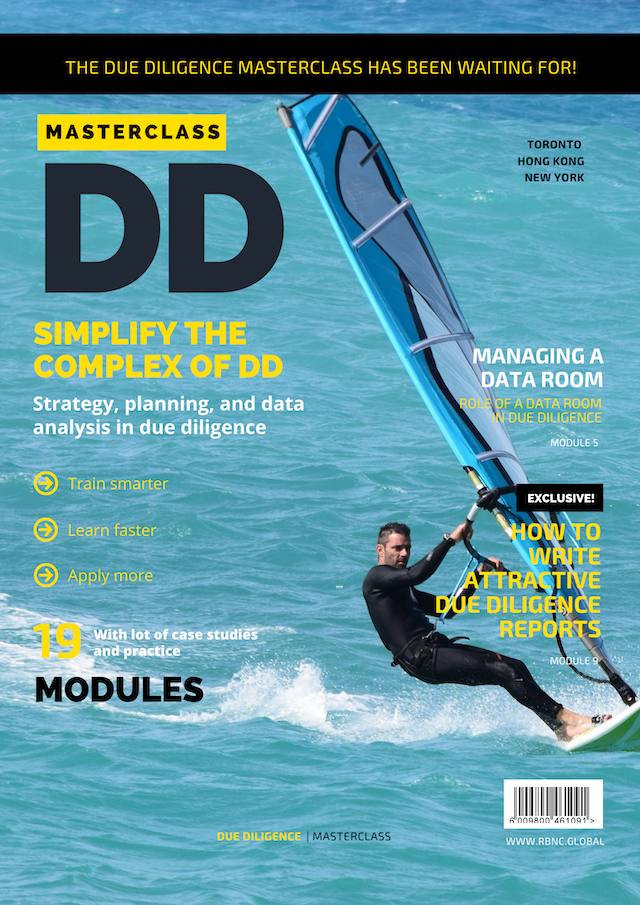Due Diligence Masterclass
Introduction
This in-depth program offers participants a thorough understanding of due diligence methodologies and best practices across diverse industries. Through interactive lectures, case studies, and hands-on exercises, participants will develop the expertise and skills needed to perform comprehensive and effective due diligence investigations
How you will benefit
- Simplify the complex of due diligence, supporting participants in remembering and applying these concepts in their current jobs and essential business decisions
- Be able to produce a cohesive due diligence methodology suitable for any investment or deal
- Gain knowledge on how a due diligence process can be useful and how you can avoid the disaster.
Who should attend
- Investment or strategy professionals
- Finance managers, business analysts, equity analysts, bankers, portfolio managers
- Finance directors, development directors, directors of strategy
- Functional/ department heads and decision-making professionals
- Financial professionals, such as CPAs and CFAs
- Business owners, entrepreneurs, investors, and consultants
- Corporate financiers, corporate planners, in-house lawyers, and company secretaries
- Any other professionals who want to upgrade their skills in due diligence
What you will cover
- What is due diligence, when is it required, and why should it be conducted?
- Importance of planning and control of due diligence
- Phases of due diligence
- Sources of due diligence data
- Real-life examples of trade debacles that resulted from inefficient due diligence protocols
- Financial and commercial due diligence
- Employee/HR due diligence
- Legal due diligence, contracts, leases and obligations
- Fixed assets due diligence
- Systems and IT due diligence
- Environmental due diligence
- The Phases Of Due Diligence
- Strategy, planning, and data analysis in due diligence
- Verification, negotiation, and completion of due diligence
- Post due diligence transactions and comfort letters
- Developing the right team
- Preparation of a checklist
- Collection of information
- Creation of Data room
- Review of documents
- Finalize reports and findings
- Role of a data room in due diligence
- Types of data rooms
- Physical data room vs. virtual data room
- What is the right team?
- Composition of the team
- Delegation of the role and responsibilities of financial experts, business analysts, and legal professionals in the due diligence team
- How to collect the information?
- What kinds of information should be collected?
- How to analyze the company information?
- Review of the company’s competitors and industry
- Importance of planning in due diligence
- Protocols for drafting a workable due diligence plan
- Naming the essential actions, targets, and deliverable s
- Significance of continual assessment and assignment supervision
- Different types of reports
- How to organize your findings?
- Prevent the usual snags in business report writing
- Comprehending the components of an ideal due diligence report
- Features and objectives of financial due diligence
- Who should undertake financial due diligence?
- How to manage critical information like purchase analyses, sales info, assets valuation, and acquisition audit
- Accounting policies and conformation to prescribed standards and norms
- Audited financial statements and analysis
- Features and principles of commercial due diligence
- Correlation between financial and commercial due diligence
- Various areas to be covered
- Business risks and other disadvantages
- Analysis of employee demographics, employee terms and agreements, and HR company policies
- Assessment of targets compensation structure and benefit plans
- Determination of any complaints against KMP
- Finalization of the list of employees in the core management team including the board of directors and key management executives
- Review of transition challenges inhuman resources in M&A
- Points to cover in legal, due diligence
- Review of pending litigation’s and its financial implication
- Adjustment of financial liabilities resulting from the litigation with valuation
- Licenses and permissions including environmental permissions and its risk on the business
- Key legal documents, such as incorporation, funding and loan documentation, contracts, and insurance and their financial implication and uncertainty on the business
- Features and objectives of environmental due diligence
- Principal players in environmental due diligence
- Structure of environmental due diligence
- Area to cover including terrestrial, aquatic, and atmospheric expulsions, contamination due to toxic waste disposal
- Civil and criminal outcomes due to negligence
- Listing and locating of company-owned assets
- Classification of assets purchased on lease and assets given as collateral’s
- Valuation of asset-based classification
- Impact of these on the business and transactions
- Features and objectives of IT due diligence
- Who should take up IT due diligence?
- Software and hardware platforms
- Systems advancement and maintenance
- Cloud computing & cyber security and its consequences
- Possibility of deceptions and other disruptions
- Assimilation of data and interpretation of results
- Influence of due diligence on decision-making
- Accomplishment of the recommendations made during due diligence
- Incorporation of finding in keys documents
- Successful assimilation of reports to crucial management
- How to organize the startup DD
- How startups DD is different
- Things to focus on the DD
- Review of IPs, products, team, market, financial and capitalization
- How to plan the cost and time
Schedule
New York
$15,000
19 - 23 Jan 2027

Other courses
Loading...








